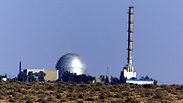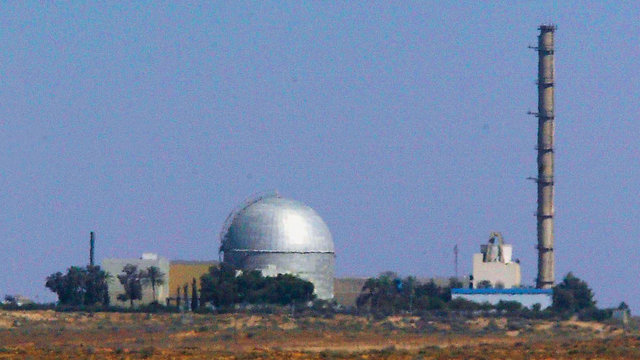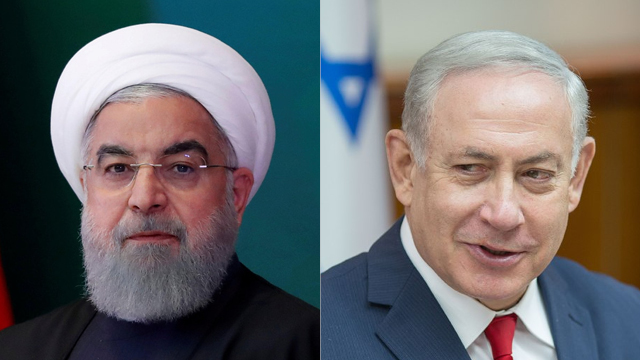
Israel reinforces security on nuclear sites amid Iran's threats
At IAEA conference, Israel’s atomic agency head Ze'ev Snir says 'Iran's threats prompt Israel to act in order to protect its nuclear sites;' Iran UN Amb. Gholamali Khoshrou says Israel's nuclear program must be supervised.
Head of the Israel Atomic Energy Commission (IAEC), Ze'ev Snir, said Israel cannot ignore Iran and its proxies' repeated threats to attack its nuclear sites at the 62nd conference of the International Atomic Energy Agency (IAEA) in Vienna Tuesday.
"Those threats prompt Israel to act in order to protect its nuclear sites," Snir stated.
"The continuing turmoil in the region, threatens peace and security worldwide, and demands global attention.
"The IAEA must conduct a robust verification of Iran's clandestine activities. The covert Iranian nuclear weapons program is a documented fact," he went on to say.
"The new information recently revealed by Israel, conclusively proves, that Iranian activities, were part of a well-orchestrated plan, to continue the development of nuclear weapons.
"In light of these destabilizing elements, we cannot ignore the repeated and explicit threats, made by Iran and its proxies, to attack Israel's nuclear sites," the IAEC head explained.
Security Cabinet member and Knesset member Minister Yisrael Katz said in an interview with Ynet Israel is constantly threatened by Iran.
"(Iran's) regime is attempting to carry out a revolution, to threaten Israel, to threaten Saudi Arabia, and everyone in the region who is not Shi'ite," he said.
"Obviously, (we are the ones mainly threatened—ed) since we are the powerful country that keeps Iran at bay. We know we have to protect our strategic locations," Katz elaborated.
"We should pose a threat to Iran and cerate a deterrence against it," he added.
It is the first time Israel has acknowledged it is reinforcing security around its nuclear reactor in Dimona.
Until now, the IAEA viewed the protection of the nuclear reactor in Dimona as a precaution against pollution rather than protection against military and terror threats.
Meanwhile, Iran has asked the United Nations to condemn Israeli threats against Tehran and to bring Israel's nuclear program under its supervision, state media reported on Thursday.
Prime Minister Benjamin Netanyahu used a visit to a secretive Israeli atomic reactor in late August to warn the country's enemies that it has the means to destroy them, in what appeared to be a veiled reference to its assumed nuclear arsenal.
"The United Nations' members should not turn a blind eye to these threats and must take firms actions to eliminate all Israeli nuclear weapons," Fars news agency quoted Iran's ambassador to the United Nations Gholamali Khoshrou as saying in letters to the UN secretary general and the Security Council.
Khoshrou asked the United Nations to force Israel to join the Nuclear Non-Proliferation Treaty (NPT) and bring its nuclear program under supervision of the IAEA, a UN atomic watchdog.
Israel, which is outside the NPT, neither confirms nor denies having the bomb, a decades-old ambiguity policy that it says keeps hostile neighbours in check while avoiding the kind of public provocations that can spark regional arms races.
Israel is trying to lobby world powers to follow the United States in exiting their 2015 deal with Iran that capped the Islamic Republic's nuclear capabilities in return for lifting of sanctions.
The Israelis deem the agreement insufficient for denying their arch-foe the means to eventually get the bomb—something that Tehran, which is a signatory to the 1970 NPT, denies wanting.
Since its 1979 Islamic Revolution, Iran has preached Israel's destruction. It backs the Lebanese terror group Hezbollah and the Palestinian terror group Hamas. Its reinforcement of Damascus during Syria's civil war is seen by the Netanyahu government as a further Iranian deployment on Israel's borders.
In Late April, Netanyahu revealed what he said was “conclusive proof” of a secret project underway in Iran for the development of a nuclear weapon—evidence that he said proved that Tehran had lied “big time” to the international community.
Israel had obtained, he said, in a “great intelligence achievement,” secrets comprising a giant trove of documents and digital information pertaining to Iran's clandestine Amad nuclear weapons project whose goal was “creating nuclear weapons”
The evidence, Netanyahu posited, prove “Iran has been hiding for years from the international community” its nuclear weapons development program.
In August 2017, Hezbollah leader Hassan Nasrallah marked 11 years to the Second Lebanon War with a speech in which he threatened that "the defeat Israel suffered in 2006, it will suffer again, but it will be a much greater defeat."
Nasrallah argued that Israel recognized Hezbollah's strength, "an example of that is the evacuation of the ammonia tank in Haifa. We hope they examine moving the nuclear reactor in Dimona as well, as it is more dangerous and needs to be taken care of."
During operation Protective Edge, Israel intercepted three rockets that were launched at Dimona.













